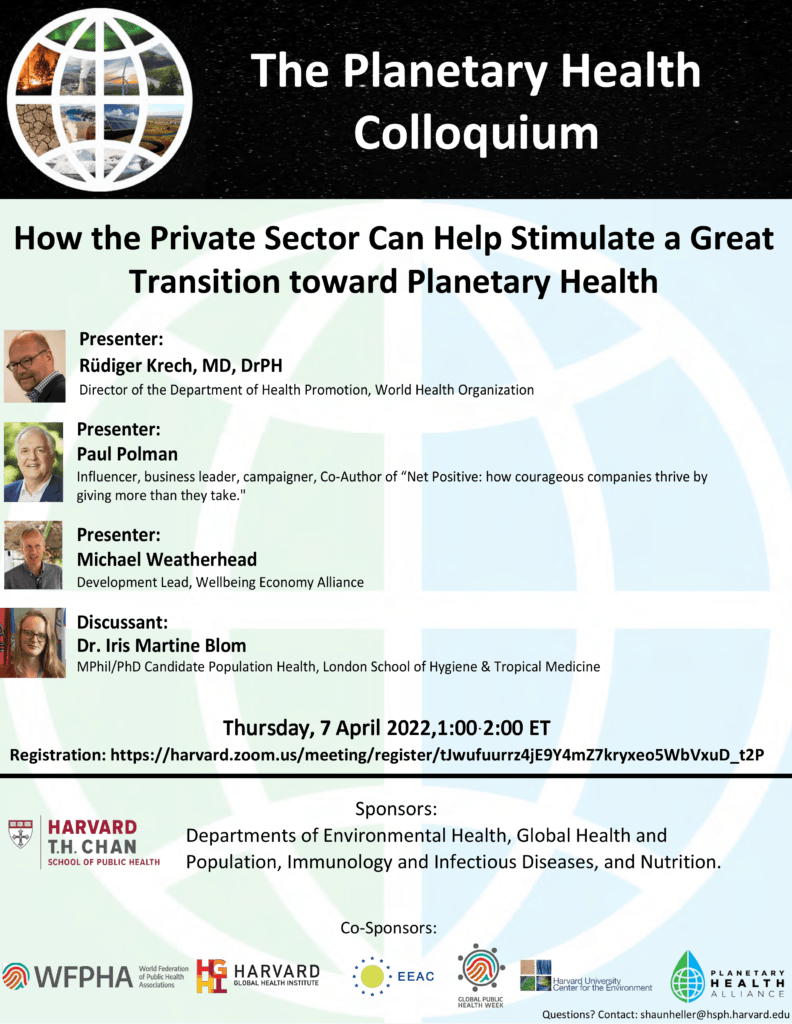
The Departments of Environmental Health, Global Health and Population, Immunology and Infectious Diseases, and Nutrition, along with Harvard University Center for the Environment, the Harvard Global Health Institute, Planetary Health Alliance, and the European Environment and Sustainable Development Advisory Councils Network (EEAC) warmly welcome Rudiger Krech, Paul Polman and Michael Weatherhead as the seventh speakers of the Planetary Health Colloquium Series, Dr. Iris Martine Blom will be the discussant. The event will be streamed live from Zoom, please register at: https://harvard.zoom.us/meeting/register/tJwufuurrz4jE9Y4mZ7kryxeo5WbVxuD_t2P
Rüdiger Krech, MD, DrPH
Dr. Rüdiger Krech is the Director of the Department of Health Promotion at the World Health Organization (WHO) in Geneva since September 2019. He heads WHO’s work on risk factors such as tobacco consumption and harmful use of alcohol; he is responsible for work on health-promoting settings and programmes for more physical activity. In addition to the normative work, his team supports member states in public health legislation and ways to impose additional taxes on unhealthy products. Prior to this, Dr. Krech was the Director of Universal Health Coverage and played a key role in placing this issue on the global health agenda. From 2009-2014, Dr. Krech was the Director of Social Determinants of Health and Equity, and was responsible, among other things, for organizing the World Conference on this topic. Prior to joining WHO, Dr. Krech worked at the German Agency for International Cooperation (GiZ), where he developed and implemented the Social Protection agenda for Germany’s development cooperation, and at the WHO Regional Office for Europe in Copenhagen, where he was Head of Unit for Healthy Aging. Dr. Krech studied educational science and human medicine and was one of the first public health (MPH) graduates of a German university in 1991. He was awarded a doctorate in public health (DrPH) at the University of Bielefeld. Dr. Krech is married and has three adult daughters.
Paul Polman
Paul Polman works to accelerate action by business to tackle climate change and inequality. A leading proponent that business should be a force for good, Paul has been described by the Financial Times as “a standout CEO of the past decade”.
As CEO of Unilever (2009-2019), he demonstrated that a long-term, multi-stakeholder model goes hand-in-hand with excellent financial performance. Paul was a member of the UN Secretary General’s High-Level Panel which developed the Sustainable Development Goals and which he continues to champion, working with global organizations and across industry to advance the 2030 development agenda.
Paul’s new book, “Net Positive”, is a call to arms to courageous business leaders, setting out how to build net positive companies which profit by fixing the world’s problems rather than creating them. He Chairs IMAGINE, a social venture dedicated to systems change, and Saïd Business School, and he is Vice-Chair of the UN Global Compact as well as a B Team Leader. Paul is Honorary Chair of the International Chamber of Commerce, which he led for two years.
Michael Weatherhead
Michael now splits his time between Glasgow and the Lake District – both excellent locations for his wellbeing – having previously been based in South Africa and Spain where he was international director of the consulting arm of NEF. He holds post-grad qualifications in economics and organisational development and loves blending rigorous analysis with innovative approaches to opening up learning spaces and finding solutions.
Dr. Iris Martine Blom
Iris Blom is a 26-year old PhD candidate at the London School of Hygiene and Tropical Medicine researching how to make health systems more sustainable and resilient in the context of climate change. She is a medical doctor from the Netherlands with a Master’s Degree in Global Affairs from Tsinghua University in Beijing, China as a Schwarzman Scholar. She has attended the COP25, COP26 and the first-ever UN Youth Climate Summit to advocate for planetary health. She is the first next-generation representative on the Steering Committee of the Planetary Health Alliance. Currently, she also represents 1.3 million medical students to the World Health Organization and works to ensure the meaningful engagement of youth voices at the highest level of global health decision making.



